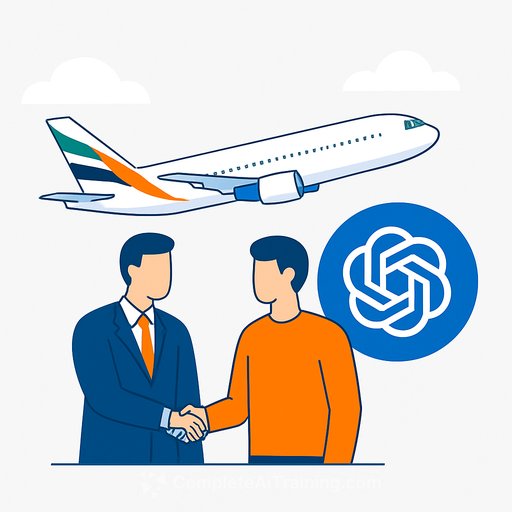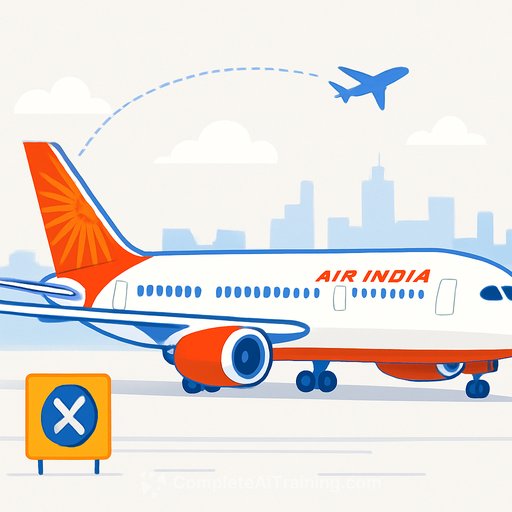Emirates Group x OpenAI: AI That Moves the Needle for Airline Operations
Published: November 22, 2025
Emirates Group has announced a collaboration with OpenAI to accelerate AI across its global operation. The goal is simple: sharpen efficiency, raise service quality, and make flying feel seamless for customers. For operations leaders, this signals a clear shift from pilots and experiments to scaled deployment.
What this means for operations teams
- Customer operations: AI chat and voice assistants to deflect routine queries, summarize case history, and route complex issues faster.
- Network and crew: Schedule optimization, crew pairing, and disruption recovery with scenario testing that balances cost, legality, and service impact.
- Airport and turnarounds: Real-time "control tower" views with proactive alerts on delays, gate conflicts, and resource constraints.
- Maintenance and reliability: Predictive maintenance to reduce AOG events, smarter parts planning, and tighter line maintenance windows.
- Fuel and sustainability: Better load forecasts, taxi-time estimates, and route adjustments that cut fuel burn and emissions.
- Passenger flow and baggage: Demand forecasting, queue-time predictions, and baggage routing that reduces mishandled bags.
- Risk and safety: Pattern detection for safety reports, fraud signals, and compliance monitoring with clear audit trails.
How the collaboration could play out end-to-end
Data from ops, fleet, crew, and customer systems feeds AI services that surface decisions in plain language. Frontline teams get copilots that suggest actions, not just dashboards. Control centers gain predictive views of the next two to six hours, with recommended responses and expected impact. Leadership tracks metrics in real time, closes gaps, and feeds learnings back into the models.
Expected outcomes the industry is already seeing
- Lower operating costs through automation, improved asset use, and fewer service failures.
- Faster recovery from disruptions with smarter rebooking and crew swaps.
- Higher customer satisfaction from quicker answers and smoother day-of-travel experiences.
- Measurable sustainability gains via fuel, weight, and route optimization.
- More productive teams thanks to AI-assisted planning, analysis, and reporting.
Guardrails to set from day one
- Data governance: Clear rules for data access, retention, and lineage across ops, customer, and safety systems.
- Human-in-the-loop: Keep critical decisions reviewed by trained staff, with solid escalation paths.
- Safety and bias checks: Test outputs against operational, legal, and ethical standards.
- Security: Vendor reviews, red-teaming, and monitoring to protect sensitive data and systems.
- Model observability: Track drift, latency, and quality; log decisions for audits.
- Change management: Train teams, update SOPs, and communicate with unions and regulators early.
90-day roadmap for operations leaders
- Pick three high-ROI pilots: contact center deflection, IROPS recovery, and predictive maintenance triage.
- Define KPIs upfront: cost per contact, on-time performance, completion factor, fuel per ASK, MTBUR.
- Stand up a cross-functional squad: operations control, airport ops, engineering, IT, safety, legal.
- Run a security and compliance review; document roles, data flows, and fail-safes.
- Train frontline teams and supervisors; capture feedback loops inside the tools.
Why this partnership matters
Large language models make complex systems usable through natural language. That means faster decision support, cleaner documentation, and better coordination across teams. With OpenAI's language and reasoning capabilities and Emirates' scale, expect practical tools that reduce friction where it actually hurts: irregular ops, maintenance delays, and service bottlenecks.
Industry ripple effects to watch
Expect higher standards for operational data quality, tighter integration across airport, airline, and ATC systems, and new benchmarks for service recovery. Groups like IATA will likely help frame best practices, metrics, and interoperability across carriers and hubs.
What to watch next
- Agent-assisted kiosks and mobile support that resolve issues at first contact.
- Predictive control towers that model ETA shifts, crew legality, and downstream gate impact.
- Deeper carbon accounting integrated with operational planning.
- Parts demand forecasting tied to fleet health and turnaround plans.
For teams building internal capability and skills, explore focused learning paths by role at Complete AI Training.
Image credit: Emirates
Your membership also unlocks:






